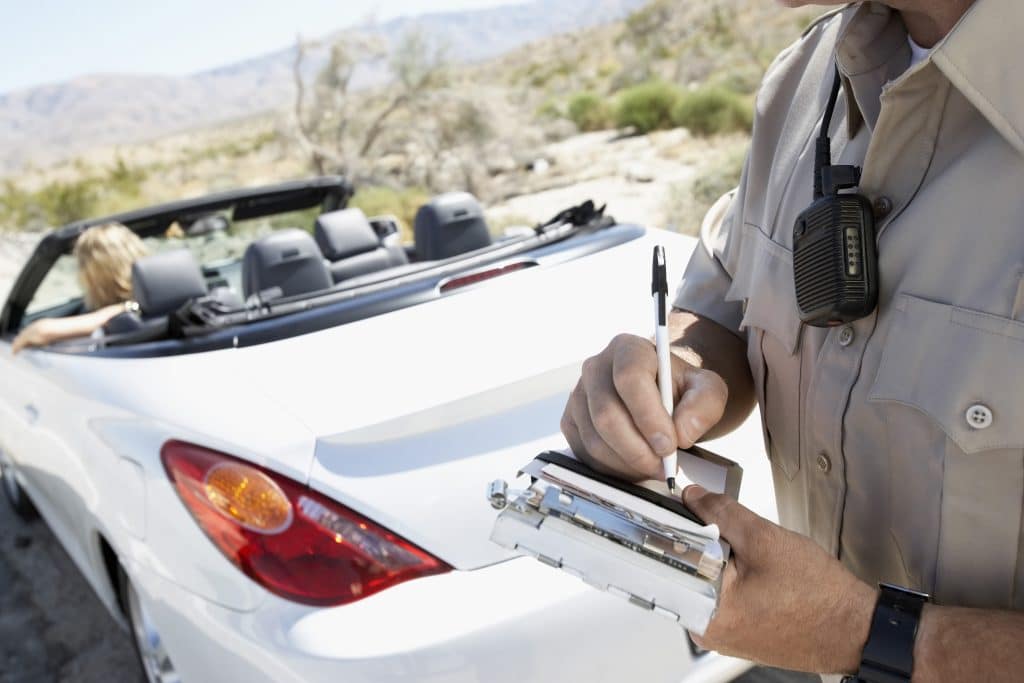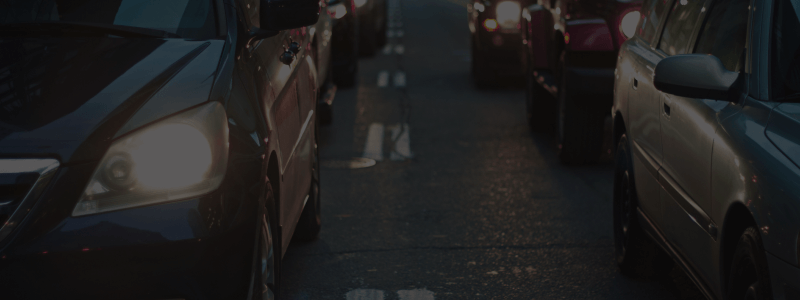
On top of the stress that can come with being involved in an auto accident in New York, sometimes drivers have to deal with traffic tickets for actions that allegedly led to the collision. In many of these cases, the police officer did not actually witness to the alleged offense and instead is relying on testimony from the drivers involved and/or witnesses to the crash.
Some commonly issued tickets that result from an auto accident are:
- Cell Phone Use VTL 1225
- Driving While Intoxicated VTL 1192
- Failure to Signal VTL 1163
- Failure to Yield VTL 1140 - 1146a
- Failure to Yield to a Pedestrian VTL 1151
- Following Too Closely (Tailgating) VTL 1129(a)
- Leaving the Scene of an Accident VTL 600
- Moved from Lane Unsafely VTL 1128(a)
- Reckless Driving VTL 1212
- Speed Not Reasonable and Prudent VTL 1180(a)
- Speeding VTL 1180
Defenses for Unwitnessed Auto Accidents
A driver changes lanes with the intent of making a right-hand turn at the upcoming light. Before fully entering the right lane, his vehicle collided with another that has entered his blind spot. The police are called and arrive at the scene and conclude based on the fact that the driver got into an accident that the driver moved from the lane unsafely and/or failed to signal. He may be issued a ticket for VTL 1128, VTL 1163, or both.
Existing case law has established that an accident does not automatically prove that a defendant is guilty of a traffic offense. According to State v. Nyangweso, "the mere fact that a collision occurred does not establish beyond a reasonable doubt that the defendant was inattentive or driving carelessly." Where a driver should be concerned is if other drivers and/or pedestrians go on the record as witnesses. Likewise, drivers should be careful not to inadvertently admit guilt. Either scenario can give the prosecution enough evidence to prove its case.
The Risks Involved in Pleading Guilty to Traffic Tickets the Result from Auto Accidents
A traffic ticket issued in association with a traffic accident must be handled carefully. Pleading guilty (which happens when one pays a ticket) to the charge allows it to be used against the driver in a personal injury lawsuit. Reducing the ticket to a lesser offense via a plea bargain may not help the driver. The best option may be to take the ticket to trial to get it either dismissed or to win a not guilty verdict. This is why it’s imperative to speak to an experienced attorney before taking action.
Does Getting a Traffic Mean You At-Fault for an Accident?
If a driver receives a traffic ticket related to an auto accident, it does not necessarily mean the driver is wholly at fault. However, it most often means the driver has some level of liability. If it is the ticketed driver who is injured, the driver may still be able to make an insurance claim, but the amount awarded will likely be much smaller. Ultimately, it depends on the offense in question and the circumstances that lead to the accident. For example, a minor speeding violation (9 mph over the limit) may not have as much impact on one’s ability to make a personal injury claim as texting while driving.
The upshot is that if the driver can beat the traffic ticket, then it cannot be used against him/her in a personal injury claim (since a judge essentially agreed the violation did not take place) and/or could increase the amount the driver can sue for.
What if Both Parties in an Accident Get a Ticket?
When both parties receive a ticket in connection with an accident it means both share fault. This does not mean that they share an equal level of fault, however. For example, a driver who failed to signal a lane change may not have as much fault as a driver who is charged with excess speed (e.g. 20 mph over the limit), since one offense is clearly more serious than the other. At the same time, both can clearly be seen as contributing to an accident. In situations like this, the advice and assistance of an attorney are vital to ensuring one is not assigned an undue amount of fault.

Need help with your NY traffic ticket?
Call Now - We've Fought Over 100,000 Traffic Violations
Quick, free, and no obligation.
Can You Be Compensated for Personal Injury if You Got a Ticket?
Yes, a person who has received a traffic ticket related to an accident can still sue and potentially win compensation, but it is far more difficult than if he/she was not ticketed. The ticket assigns a certain amount of liability to the driver in question and can severely limit the size of the award possible. That’s why it is essential that a driver who is ticketed should hire an attorney who can potentially get the ticket dismissed or get the driver acquitted.
Are Police Reports Used in Personal Injury Cases?
It depends. The insurance company can and often will access the police report as part of the effort to determine fault in an accident. The report will help inform how much the insurer is willing to award to one or both parties. If the injured driver is found to be at fault, the police report may be used to deny a claim or offer a small settlement. Conversely, if the driver is found to not be at fault, the police report becomes leverage to potentially win significant compensation.
When a personal injury claim goes to court, the police report is less relevant. A police report is considered hearsay in court--in other words, the officer did not witness the accident and is only relaying third-party claims about what took place. An officer who did witness the accident first hand may be asked to submit testimony in court. But it is unlikely that the police report itself will be used.
Case Law on NY Traffic Tickets and Auto Accidents
New York State has long determined that violating traffic laws creates “absolute liability” in cases involving injury or death (Elliot v City of New York, 95 NY2d 730, 734). In the personal injury case of Pinto v Tennenbaum, Slip Op 50523, the defendant was found to be liable for injuries to a pedestrian due, in large part, to his conviction for a cell phone violation. In the appeal, this liability was upheld despite many discrepancies, including eye witness accounts and the fact that the plaintiff was struck on his right side but was suing for injuries sustained on his left side.
Similarly, in Darmento v PAC. MOLASSES CO., INC., 81 NY 2d 985, the New York State Supreme Court upheld that the facts of a personal injury case were triable due to the defendant’s violation of VTL 1129(a) (tailgating). The plaintiff of the case lost control of his vehicle on an icy road after being frightened to find a tractor-trailer vehicle following his passenger car too closely. It was only after the plaintiff struck a guard rail that the following commercial vehicle driven by the defendant collided with the plaintiff’s car. The defendant’s attorney argued, “a finding of negligence could not be based upon that violation because the statute was not intended to protect against the risk of a collision of this nature”--meaning the defendant did not cause a rear-end collision. The NY Supreme Court disagreed, stating:
[I]t is clear that there is a violation of law when a driver follows another too closely without adequate reason and that a collision — rear-end or otherwise — is not required. While a rear-end collision is the most obvious type of accident to occur as a result of tailgating, other types of accidents also may occur.
How do I Get Help with an Accident-Related Traffic Ticket?
It is essential that you hire an attorney if you or someone you love has been ticketed for an offense related to a traffic accident in New York or New Jersey. The lawyers at Rosenblum Law are skilled defense and traffic ticket attorneys who can help you mitigate or avoid the worst consequences. Email Rosenblum Law or call 888-8883-5529 today for a free consultation about your case.


